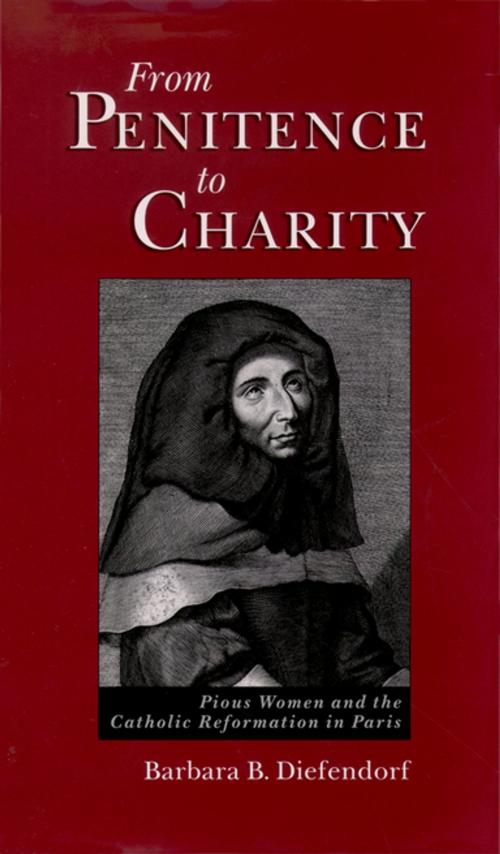From Penitence to Charity
Pious Women and the Catholic Reformation in Paris
Nonfiction, History, France, Religion & Spirituality, Christianity, Denominations, Catholic, Catholicism| Author: | Barbara B. Diefendorf | ISBN: | 9780190282608 |
| Publisher: | Oxford University Press | Publication: | July 15, 2004 |
| Imprint: | Oxford University Press | Language: | English |
| Author: | Barbara B. Diefendorf |
| ISBN: | 9780190282608 |
| Publisher: | Oxford University Press |
| Publication: | July 15, 2004 |
| Imprint: | Oxford University Press |
| Language: | English |
From Penitence to Charity radically revises our understanding of women's place in the institutional and spiritual revival known as the Catholic Reformation. Focusing on Paris, where fifty new religious congregations for women were established in as many years, it examines women's active role as founders and patrons of religious communities, as spiritual leaders within these communities, and as organizers of innovative forms of charitable assistance to the poor. Rejecting the too common view that the Catholic Reformation was a male-dominated movement whose principal impact on women was to control and confine them, the book shows how pious women played an instrumental role, working alongside--and sometimes in advance of--male reformers. At the same time, it establishes a new understanding of the chronology and character of France's Catholic Reformation by locating the movement's origins in a penitential spirituality rooted in the agonies of religious war. It argues that a powerful desire to appease the wrath of God through acts of heroic asceticism born of the wars did not subside with peace but, rather, found new outlets in the creation of austere, contemplative convents. Admiration for saintly ascetics prompted new vocations, and convents multiplied, as pious laywomen rushed to fund houses where, enjoying the special rights accorded founders, they might enter the cloister and participate in convent life. Penitential enthusiasm inevitably waned, while new social and economic tensions encouraged women to direct their piety toward different ends. By the 1630s, charitable service was supplanting penitential asceticism as the dominant spiritual mode. Capitalizing on the Council of Trent's call to catechize an ignorant laity, pious women founded innovative new congregations to aid less favored members of their sex and established lay confraternities to serve society's outcasts and the poor. Their efforts to provide war relief during the Fronde in particular deserve recognition.
From Penitence to Charity radically revises our understanding of women's place in the institutional and spiritual revival known as the Catholic Reformation. Focusing on Paris, where fifty new religious congregations for women were established in as many years, it examines women's active role as founders and patrons of religious communities, as spiritual leaders within these communities, and as organizers of innovative forms of charitable assistance to the poor. Rejecting the too common view that the Catholic Reformation was a male-dominated movement whose principal impact on women was to control and confine them, the book shows how pious women played an instrumental role, working alongside--and sometimes in advance of--male reformers. At the same time, it establishes a new understanding of the chronology and character of France's Catholic Reformation by locating the movement's origins in a penitential spirituality rooted in the agonies of religious war. It argues that a powerful desire to appease the wrath of God through acts of heroic asceticism born of the wars did not subside with peace but, rather, found new outlets in the creation of austere, contemplative convents. Admiration for saintly ascetics prompted new vocations, and convents multiplied, as pious laywomen rushed to fund houses where, enjoying the special rights accorded founders, they might enter the cloister and participate in convent life. Penitential enthusiasm inevitably waned, while new social and economic tensions encouraged women to direct their piety toward different ends. By the 1630s, charitable service was supplanting penitential asceticism as the dominant spiritual mode. Capitalizing on the Council of Trent's call to catechize an ignorant laity, pious women founded innovative new congregations to aid less favored members of their sex and established lay confraternities to serve society's outcasts and the poor. Their efforts to provide war relief during the Fronde in particular deserve recognition.















